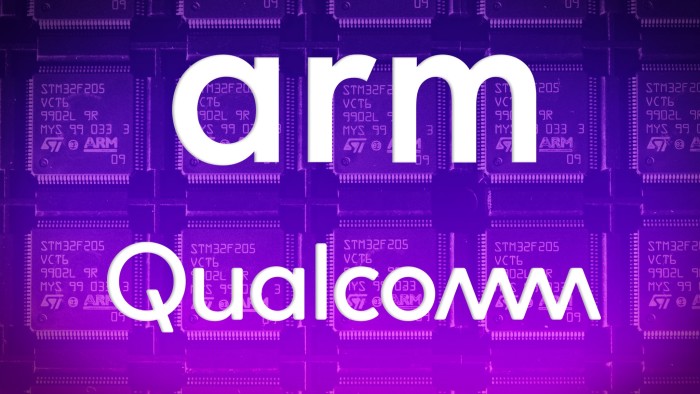Chip groups Arm and Qualcomm square off in high-stakes US trial

Unlock the Editor’s Digest for free
Roula Khalaf, Editor of the FT, selects her favourite stories in this weekly newsletter.
Arm and Qualcomm’s bitter legal feud over licensing of chip design is heading to trial on Monday, in a high-stakes battle that will shed light on how two of the world’s biggest chip companies — and former allies — turned against each other over a $1.4bn start-up acquisition.
The Delaware trial, which is expected to last about a week, is set to feature testimony from both Arm chief executive Rene Haas and Qualcomm chief executive Cristiano Amon.
At the heart of the dispute is Qualcomm’s acquisition of Santa Clara-based chip designer Nuvia in 2021, which had a chip architecture licence from Arm. At the same time Qualcomm is one of Arm’s biggest customers, with its own licence for Arm’s architecture, which is used as a foundation for designing chips.
SoftBank-backed Arm alleged that Qualcomm failed to secure the required consent to transfer Nuvia’s licence after the acquisition, and is now using Arm’s intellectual property without its permission. Qualcomm has countered that its existing licence with Arm is sufficient.
Arm sued Qualcomm, in what it has described as a last-resort move to protect its intellectual property. It marks the first time in Arm’s 34-year history that it has taken such a drastic step, bringing its confidential licensing arrangements into full view in a public courtroom.
Qualcomm, on the other hand, is no stranger to intellectual property disputes, having squared off before with the likes of Apple, which challenged Qualcomm patents in wide-ranging litigation that ended in a settlement in 2019.
It has decried Arm’s move as an attempt to squeeze out higher royalty rates and interfere with its product road map as both companies expand into new markets.
Nuvia technology has been used in Qualcomm’s Snapdragon processors for PCs, phones and cars. Its new smartphone processors were launched this year and have been adopted by companies such as Samsung, and its PC chips count Microsoft and Dell among their customers.
Rather than seeking monetary damages, Arm is asking the court to order Qualcomm to destroy products found to infringe on its intellectual property. In October, as Qualcomm held its annual conference in Hawaii, Arm formally notified Qualcomm that it would terminate its architecture licence if Qualcomm did not address the alleged breach.
Such an extreme measure would have a major impact on Qualcomm, which relies on the Arm architecture for most of its new products. But it would also cost Arm an important customer at a time when it is seeking to broaden the reach of its ecosystem, riding high on enthusiasm for artificial intelligence after a successful IPO last year.
Qualcomm has countersued Arm over the move. A 60-day notice period triggered by Arm — which requires Qualcomm to address its concerns or face the loss of its licence — will expire around the same time the trial is expected to end.
Nuvia was co-founded and led by former top Apple chip designer Gerard Williams, now a senior engineer at Qualcomm, who is also due to testify at the trial.
If Arm convinces the jury of its case, it will then fall to the federal judge overseeing it, Maryellen Noreika, to decide what remedies to impose. An appeal by whichever side loses the case is also likely.
“It’s really not in either of their best interests to go nuclear,” said Stacy Rasgon, an analyst at Bernstein. “I think it would make sense to see a settlement — they need each other.”
#Chip #groups #Arm #Qualcomm #square #highstakes #trial






